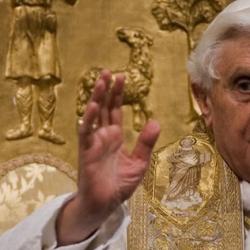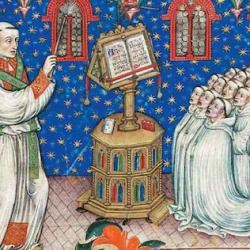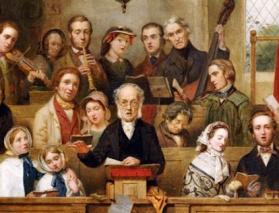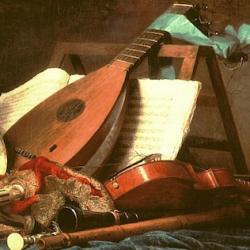A couple of interesting lectures on Music and Theology in the Christian Systematic Theology group of AAR. Nick Adams offered a very detailed and technical discussion of Messiaen’s Messe de la Pentecote in order to explore some issues in doctrinal change and continuity. He noted that Messiaen employed plainchant and Hindu rhythms in the piece, and raised the question of when a stretch in a tradition becomes a break with tradition. Messiaen is not simply quoting plainsong, but it’s deliberately and recognizably there (or recognizably once a well-informed interpreter like Adams points it out). He also noted the importance of the fact that music does what it does non-representationally, and raised the question of what that might mean for the ways we do theology, especially in Protestant churches where representation is either downplayed or outright prohibited.
Spinning out some philosophical observations from his musical analysis, Adams pointed out that Messiaen’s music is not immediately aurally comprehensible; meaning is not instantly audible. It is not transparent, as we tend to think visual information is transparently meaningful. Musical modes of theology thus emphasize the mysterious character of theology. He suggested along the lines that orthodoxy is a matter of “rules for transforming melody.” I’d want to say more, but I do think that this captures one aspect of orthodoxy quite neatly. Adams emphasized that theologians who attempt to work with musical analogies and materials must be sure that they are actually paying attention to music, and not merely using musical conceptualities to reach pre-determined conclusions.
David Franks of Boston College followed with a comparison of the music of Schoenberg and Franz Schmidt in late 19th-century Vienna. He analyzed Schoenberg’s Moses and Aaron, where the composer interprets Moses’ attack on Aaron as an attack on representation. When Aaron responds that the letters on tablets of stone are also representational, Moses breaks the tablets too. Schoenberg was never able to finish the opera, which ends with Moses lamenting the words that he lacks. Schoenberg ends with a kind of gnostic silence. In his musical rendition of Revelation, the Book of the Seven Seals, Schmidt by contrast combined literary, eschatological and prophetic realities to suggest that God’s beauty erupting in the world is part of his warfare and victory over sin.















